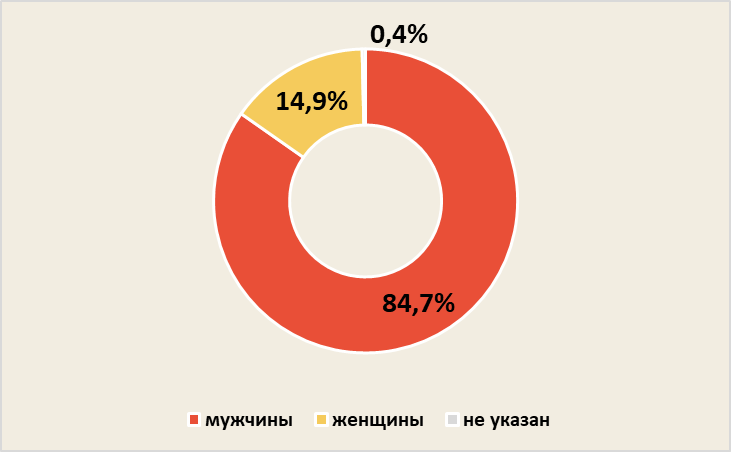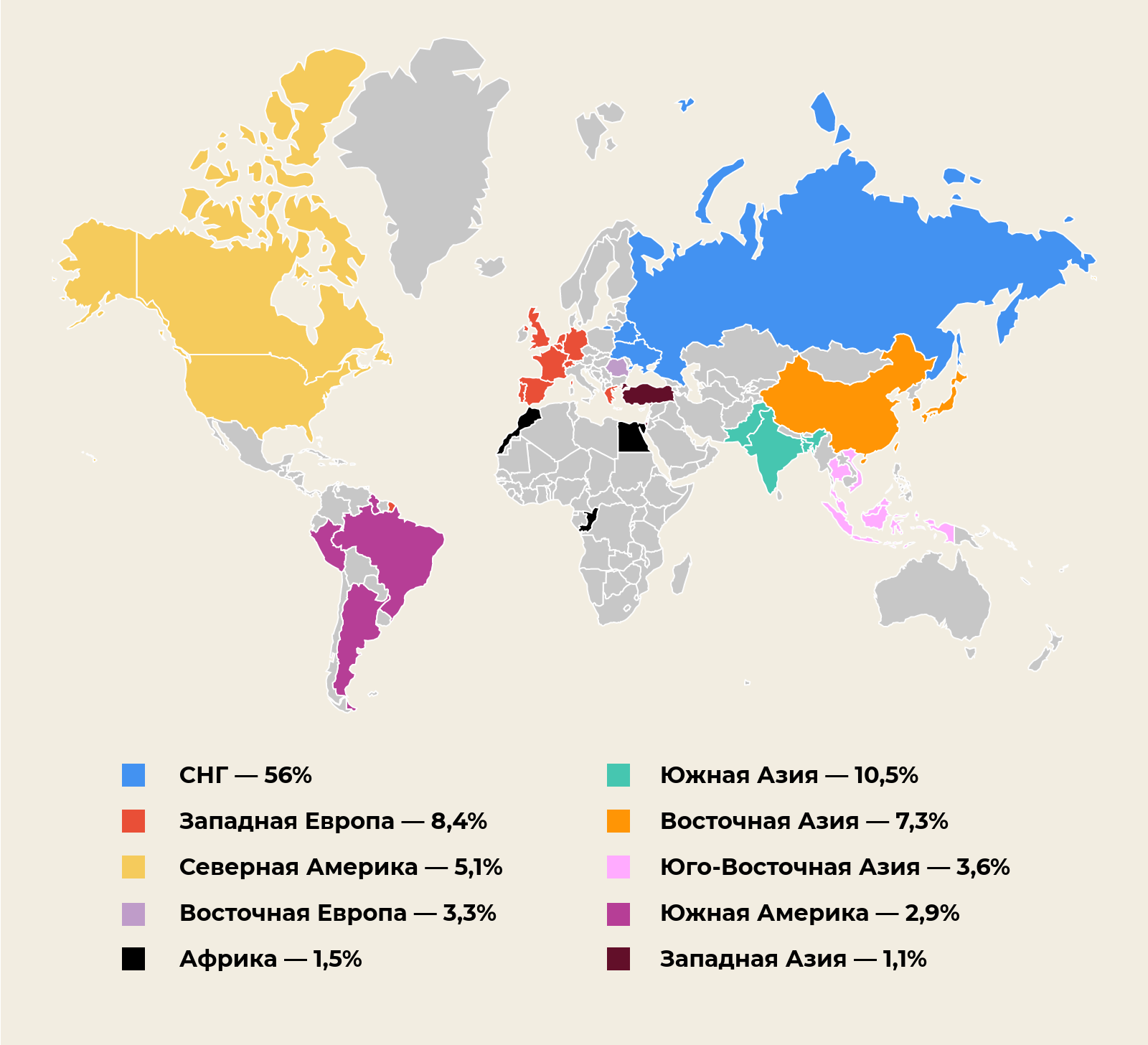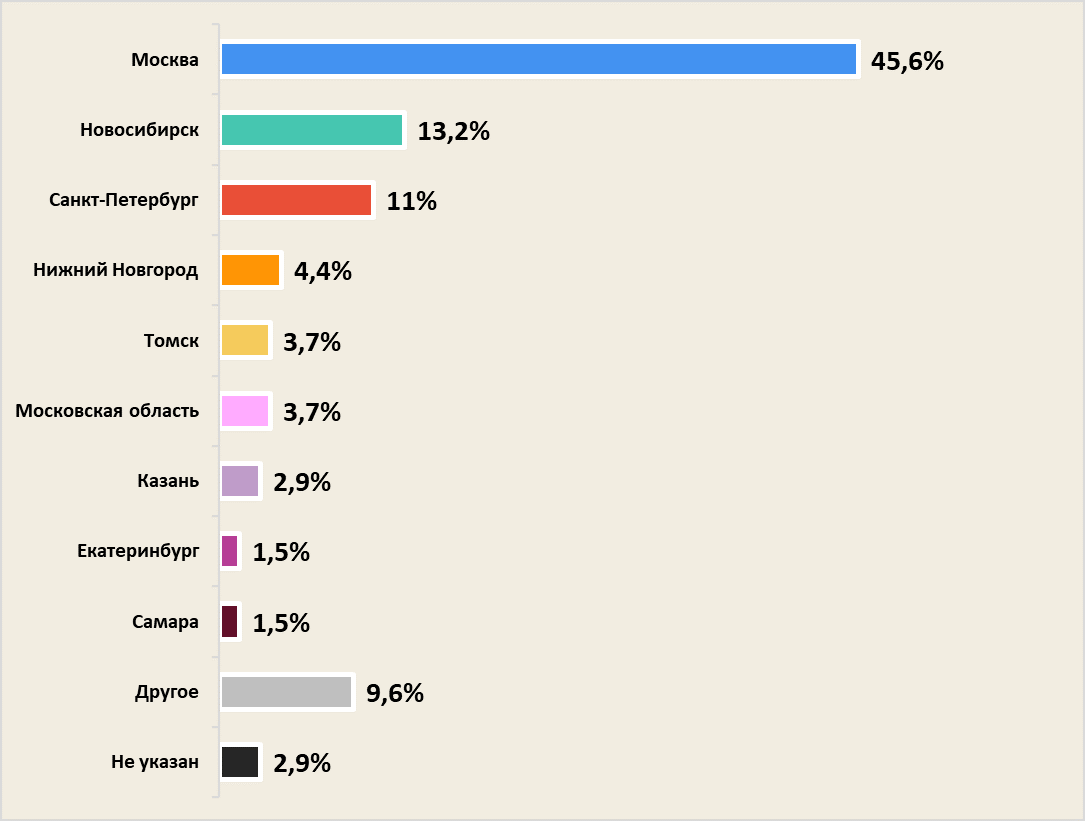Collective portrait of the participants of the contest MERC-2017
Our first machine learning and data analysis contest, the Multimodal Emotion Challenge Recognition (MERC-2017) at the Datacombats site, is coming to an end . In this post we would like to present a small analysis of the audience, a kind of collective “portrait”.

A total of 275 people registered for the contest. We note that we are pleased with the demographic slice that was obtained as a result. In general, we can say that there were no surprises - the averaged profile of the participant fully meets the objectives of the competition.
Gender composition is predictable: the main part of the audience is male. The female part of the audience was almost 15%, which, in general, reflects the current global level of representation of the fair sex in the field of IT.
')

On this basis, the largest group is the participants aged from 20 to 25, that is, students, graduate students and young professionals. These data correlate with the occupation of the participants described below. In second place is the age group from 26 to 35 years. It is probably appropriate to say that data science and machine learning as “hot” areas of knowledge attract graduates and experts who are focused on active career development in this particular area, given its market demand and attractive prospects.

The geographical distribution also turned out to be quite predictable: half are participants from Russia. However, we are glad that we managed, if not to cover (we still have to work on this further), then, at a minimum, “hook” on representatives of various states in all parts of the world.

The geography of the countries of residence of the contest participants:
CIS: Russia, Ukraine, Belarus
South Asia: India, Bangladesh, Pakistan
Western Europe: France, Germany, UK, Belgium, Netherlands, Switzerland, Spain, Portugal, Greece
North America: USA, Canada
Southeast Asia: Indonesia, Malaysia, Thailand, Vietnam
Eastern Europe: Romania
South America: Argentina, Brazil, Guyana, Peru, and the same overseas possessions of France - Guadeloupe and St. Maarten
Africa: Morocco, Egypt, Republic of the Congo
Western Asia: Turkey, Israel

If we take only the Russian audience, here in the TOP-3 are Moscow, Novosibirsk and St. Petersburg, while the capital is leading by a large margin (45.6%). In the TOP there are representatives of other Russian centers with a strong expertise in the direction of data science - Nizhny Novgorod, Yekaterinburg, Tomsk, Kazan. For some reason, Voronezh, Kaliningrad, the Far East, for example, fell out completely (we will try to fix it next time).

By occupation, the key group consists of technical / IT students (34.2%). The second place is shared by representatives of the Academy (scientists, researchers, researchers) and representatives of the IT sector (Software developers / programmers). In third place are data scientists. The classification is conditional, since it is compiled on the basis of personal data, where participants describe the type of activity in a free form.

As for educational institutions, the majority of participants are students and graduates of Russian universities. The top five include the National Research University Higher School of Economics (HSE), Moscow State University named after MV Lomonosov (MSU), Novosibirsk State University, Skoltech, and the Moscow Institute of Physics and Technology (MFTI). However, 2 foreign universities - the Belarusian State University and the Technical University of Cluj-Napoca (Romania) were in the TOP.

We noted with interest that representatives of many prestigious universities were registered for the competition, here are just a few of them:
USA: Massachusetts Institute of Technology, Carnegie Mellon University, University of California, Berkeley, University of Michigan, University of Pennsylvania.
China: Chinese Academy of Sciences, Shanghai University, Peking University, Zhejiang University.
South Korea: Seoul University, Korea Advanced Technology Institute, Gachon University.
India: Indian Institute of Technology in Mumbai.
Malaysia: Putra University.
Ukraine: Kiev Polytechnic Institute, Ivan Franko Lviv National University.
Germany: University of Ulm, Munich Technical University, University of Passau, Braunschweig Technical University.
Switzerland: Swiss High School of Technology Zurich.
France: Polytechnic School (Paris).
Spain: Pompeu Fabra University.
Portugal: University of Lisbon.
Greece: Athens Polytechnic University.
Israel: Hebrew University in Jerusalem.
If you look a little more closely at the specialization that the participants indicated, you should immediately clarify that some designated it quite widely (IT or computer science), while others, on the contrary, tried to give a precise definition (give the official name of the specialty or diploma topic). It is obvious to us that the majority of registered participants are representatives of specialized areas, we were slightly surprised only by a freelance writer, everything else seems logical and explainable.

The sum of all options is more than 100%, since some participants indicated several specialized specializations at once.
We will continue to move in three directions:
We will tell you more about the winners of MERC-2017 and the decisions of the finalists in the next post, after the official completion of the competition.
Publication author:
Alexandra Smirnova, expert on crowdsourcing projects and external relations of the Neurodata Lab

Demographics of participants
A total of 275 people registered for the contest. We note that we are pleased with the demographic slice that was obtained as a result. In general, we can say that there were no surprises - the averaged profile of the participant fully meets the objectives of the competition.
Floor
Gender composition is predictable: the main part of the audience is male. The female part of the audience was almost 15%, which, in general, reflects the current global level of representation of the fair sex in the field of IT.
')

Age
On this basis, the largest group is the participants aged from 20 to 25, that is, students, graduate students and young professionals. These data correlate with the occupation of the participants described below. In second place is the age group from 26 to 35 years. It is probably appropriate to say that data science and machine learning as “hot” areas of knowledge attract graduates and experts who are focused on active career development in this particular area, given its market demand and attractive prospects.

Geography by region
The geographical distribution also turned out to be quite predictable: half are participants from Russia. However, we are glad that we managed, if not to cover (we still have to work on this further), then, at a minimum, “hook” on representatives of various states in all parts of the world.

The geography of the countries of residence of the contest participants:
CIS: Russia, Ukraine, Belarus
South Asia: India, Bangladesh, Pakistan
Western Europe: France, Germany, UK, Belgium, Netherlands, Switzerland, Spain, Portugal, Greece
North America: USA, Canada
Southeast Asia: Indonesia, Malaysia, Thailand, Vietnam
Eastern Europe: Romania
South America: Argentina, Brazil, Guyana, Peru, and the same overseas possessions of France - Guadeloupe and St. Maarten
Africa: Morocco, Egypt, Republic of the Congo
Western Asia: Turkey, Israel
Top 11 countries

Top 9 cities of Russia
If we take only the Russian audience, here in the TOP-3 are Moscow, Novosibirsk and St. Petersburg, while the capital is leading by a large margin (45.6%). In the TOP there are representatives of other Russian centers with a strong expertise in the direction of data science - Nizhny Novgorod, Yekaterinburg, Tomsk, Kazan. For some reason, Voronezh, Kaliningrad, the Far East, for example, fell out completely (we will try to fix it next time).

Occupation
By occupation, the key group consists of technical / IT students (34.2%). The second place is shared by representatives of the Academy (scientists, researchers, researchers) and representatives of the IT sector (Software developers / programmers). In third place are data scientists. The classification is conditional, since it is compiled on the basis of personal data, where participants describe the type of activity in a free form.

Universities
As for educational institutions, the majority of participants are students and graduates of Russian universities. The top five include the National Research University Higher School of Economics (HSE), Moscow State University named after MV Lomonosov (MSU), Novosibirsk State University, Skoltech, and the Moscow Institute of Physics and Technology (MFTI). However, 2 foreign universities - the Belarusian State University and the Technical University of Cluj-Napoca (Romania) were in the TOP.

We noted with interest that representatives of many prestigious universities were registered for the competition, here are just a few of them:
USA: Massachusetts Institute of Technology, Carnegie Mellon University, University of California, Berkeley, University of Michigan, University of Pennsylvania.
China: Chinese Academy of Sciences, Shanghai University, Peking University, Zhejiang University.
South Korea: Seoul University, Korea Advanced Technology Institute, Gachon University.
India: Indian Institute of Technology in Mumbai.
Malaysia: Putra University.
Ukraine: Kiev Polytechnic Institute, Ivan Franko Lviv National University.
Germany: University of Ulm, Munich Technical University, University of Passau, Braunschweig Technical University.
Switzerland: Swiss High School of Technology Zurich.
France: Polytechnic School (Paris).
Spain: Pompeu Fabra University.
Portugal: University of Lisbon.
Greece: Athens Polytechnic University.
Israel: Hebrew University in Jerusalem.
Specialty
If you look a little more closely at the specialization that the participants indicated, you should immediately clarify that some designated it quite widely (IT or computer science), while others, on the contrary, tried to give a precise definition (give the official name of the specialty or diploma topic). It is obvious to us that the majority of registered participants are representatives of specialized areas, we were slightly surprised only by a freelance writer, everything else seems logical and explainable.

The sum of all options is more than 100%, since some participants indicated several specialized specializations at once.
Summary
We will continue to move in three directions:
- Work on the promotion of the site and the formation of a community loyal to Emotion AI issues. Foreshadowing possible questions about why we didn’t go for Kaggle, we want to build a community around us, connected with emotional computing and emotion recognition technologies, and, of course, stand at the helm :).
- Reach a wider audience. We definitely have where to grow. For example, among the participants there were no representatives of many regional universities. Even the capital technical universities were not fully represented. And, of course, we are interested in the fact that the list of participants in the future would be truly international. We deliberately made the platform in English. Why? We believe that only on a completely open platform for all in the conditions of transparent competition and the spirit of competition can truly breakthrough ideas be born. In other words, if you know where (communities, forums, blogs) Chinese, Indian, American, French, German, Brazilian, Japanese, Malaysian, Korean, Australian Lerner and Data Scientists spend their time, we will be grateful for the tip-off comments.
- Involvement of the audience. So, the participants downloaded the data and left to work either ... just left. Since the main part of the work goes off-screen, it is very difficult to diagnose: “the patient is more alive than dead, or rather dead than alive”. In the first competition, all our posts were informational and organizational in nature. We expected that substantive questions would come more from the participants; We believe that we, as the organizers, should more actively initiate meaningful discussions on the subject of the competition. We believe that it is worthwhile to introduce control points in the course of the competition and associate them with the prize policy. In general, we will think about the tools.
We will tell you more about the winners of MERC-2017 and the decisions of the finalists in the next post, after the official completion of the competition.
Publication author:
Alexandra Smirnova, expert on crowdsourcing projects and external relations of the Neurodata Lab
Source: https://habr.com/ru/post/342990/
All Articles